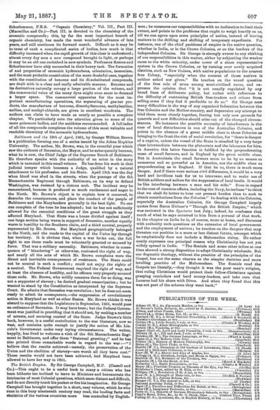The British Empire. By Sir George Campbell, M.P. (Cassell and
Co.)—This ought to be a useful book to many a citizen who has been hitherto too inclined to leave to Ministers and bureaucrats the intricacies of moat Colonial questions, which seem distant and difficult, and do not directly touch his pocket or fire his imagination. Sir George Campbell has brought together in a short, easy volume, which he who rens in this buoy nineteenth century may read, the leading facts and etatistice of the various countries more leas controlled by English. men ; he measures oar responsibilities with no inclination to limit their extent, and points to the problems that ought to weigh heavily on us, till we can agree upon some principles of action, instead of leaving matters to the drifting and shifting of temporary expedients. For instance, one of the chief problems of empire is the native question, whether in India, or in the Crown Colonies, or on the borders of the independent Colonies. Sir George is strongly averse to any shirking of our responsibilities in this matter, either by subjecting the weaker races to the white minority, ander cover of a sham representative system in the Crown Colonies, or by turning over newly acquired districts, such as New Guinea, with native populations to the nearest free Colony, "especially when the consent of those natives is neither asked nor given." He teaches on the vexed question of the free sale of arms among semi-civilised races, and ex- presses the opinion that "it is not usually regulated by any broad lines of deliberate policy, but rather with reference to the difficulty of restraining British free-traders and others from selling arms if they find it profitable to do so." Sir George sees many difficulties in the way of any organised federation between the free Colonies and the Mother-country, and deprecates any attempt to bind them more closely together, fearing lest only new grounds for quarrels and new difficulties should arise out of the changed circum- stances. He instances the possible necessity of interference in the case of local disturbances in one of the Australian Colonies, and points to the absence of a great middle class in those Colonies as bringing to the front the risk of social revolution, for " there is danger of a capsize, unless the vessel of the State is steadied by a very large class intermediate between the plutocrats and the labourers for hire. In America this latter function is fulfilled by the preponderating mass of email farmers, and in England by the groat middle class. But in Australasia the small farmers seem to be by no means no numerous and so powerful as in America, nor the middle class an preponderating as in England. If that be so, there is much more danger. And if there were serious civil differences, it would be a very hard and invidious task for us to intervene, and to make use of British soldiers and sailors for the suppression of local broils. It would be like interfering between a man and his wife." Even in regard to the met of common affairs, including the Navy, he inclines "to think that we shall do better to bear our present burden than to seek to obtain contributions from the Colonies." In dealing with the Colonies, especially the Australian Colonies, Sir George Campbell largely quotes from Baron Hubner's " Through the British Empire," which was reviewed in the Spectator last July; indeed, he confesses that much of what he says occurred to him from a perusal of that work. In the chapter on India he is, of course, more at home, and discusses with authority such questions as the extension of local government and the employment of natives ; he touches on the dangers that may threaten our position in a more or less distant future, amongst which he emphatically does not include a Mahomedan rising. He rather neatly expresses one principal reason why Christianity has not yet widely spread in India. "The Sontals and some other tribes at one time showed a strong disposition to adopt Christianity wholesale. But our dogmatic theology, without the practice of the principles of the Gospel, has not the Mlle charms as the simpler doctrine and more levelling practice of the Mahomedans. The Boatels read the Gospels too literally they thought it was the poor man's religion, that rating Christians would protect their fellow-Christians against grasping zemindate and hard money-lenders, and take care that Lazarus had his share with Dives. And when they found that this was not part of the scheme they went back."


















































 Previous page
Previous page